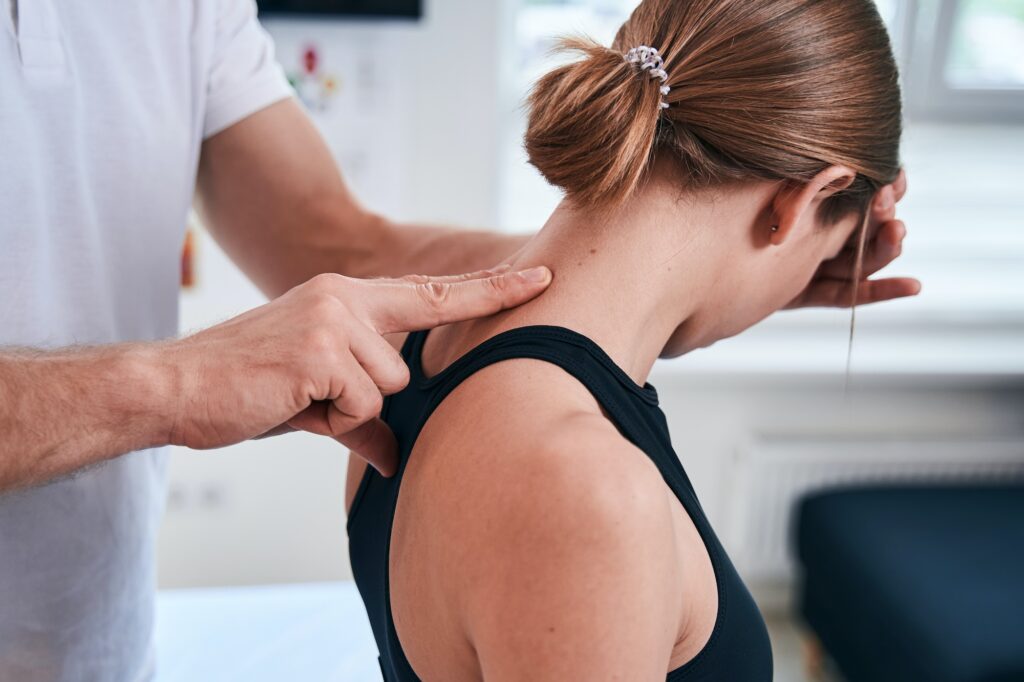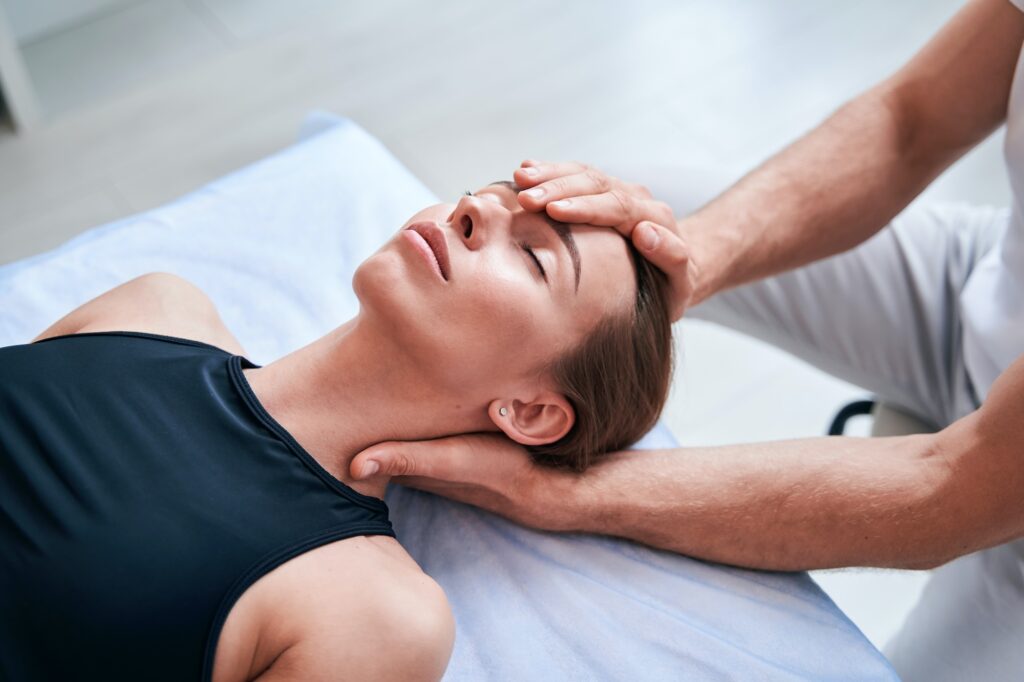Relieve Muscle Knots in the Neck: Effective Techniques to Try Now

Are you experiencing discomfort in your neck? Do you feel like there are tight, painful knots in your muscles that just won’t go away? You’re not alone. Muscle knots in the neck are a common issue that many people face, whether it’s due to poor posture, stress, or an injury.
Muscle knots, also known as trigger points, are areas of tightness and tenderness in the muscle tissue. When it comes to the neck, these knots can cause a range of symptoms, including pain, stiffness, and limited range of motion. If left untreated, they can even lead to headaches and migraines.
Fortunately, there are ways to relieve muscle knots in the neck and reduce discomfort. From stretching and massage to heat therapy and acupuncture, there are a variety of techniques that can help ease tension and promote healing. If you’re struggling with muscle knots in your neck, consider visiting Lake Country Physiotherapy in Orillia. Our team of skilled professionals can help you find the right treatment plan to alleviate your symptoms and get you back to feeling your best.
Understanding Muscle Knots
If you’ve ever experienced a tight, painful spot in your neck or upper back, you may have a muscle knot. Muscle knots, also known as trigger points, are a common cause of neck pain and discomfort. Understanding what muscle knots are and what causes them can help you prevent and relieve them.
Defining Trigger Points
Muscle knots, or trigger points, are areas of hyperirritability in muscle tissue. These points can be felt as tight, painful spots in the muscle, and can cause referred pain to other areas of the body. Trigger points can develop in any muscle, but are most common in the neck, shoulders, and upper back.
Causes of Muscle Knots
There are several factors that can contribute to the development of muscle knots. Stress and poor posture are two common causes. When you’re stressed, your muscles tense up, which can lead to the development of trigger points. Poor posture can also cause muscle tension and lead to the formation of knots.
Injury and overuse can also cause muscle knots. If you’ve recently injured your neck or upper back, you may be more prone to developing trigger points. Overuse, such as spending long hours working at a computer or carrying heavy bags, can also lead to muscle tension and trigger point formation.
Connective tissue can also play a role in the development of muscle knots. When connective tissue, such as fascia, becomes tight or restricted, it can compress muscles and lead to the formation of trigger points. This can cause pain and discomfort, as well as headaches.
Self-Care Techniques
If you are experiencing muscle knots in your neck, there are several self-care techniques you can use to help relieve the pain and discomfort. Here are some effective methods you can try:
Stretching Routines
Stretching is a great way to relieve muscle tension and reduce the risk of developing muscle knots. Here are some stretches you can try:
- Chin tucks: Sit up straight and gently tuck your chin towards your chest. Hold for 10-15 seconds and then release.
- Neck rotations: Slowly turn your head to the left and hold for 10-15 seconds. Repeat on the right side.
- Shoulder shrugs: Raise your shoulders up towards your ears and hold for 5-10 seconds. Release and repeat.
Self-Massage Methods
Self-massage can help to release muscle tension and reduce the severity of muscle knots. Here are some self-massage methods you can try:
- Trigger point self-massage: Use a tennis ball or foam roller to apply pressure to the trigger point. Hold for 30-60 seconds and then release.
- Neck and shoulder massage: Use your fingers to gently massage the neck and shoulder muscles. Apply pressure to any knots you feel and work them out.
Heat and Ice Application
Heat and ice can be effective ways to reduce muscle spasms and relieve pain. Here are some methods you can try:
- Heat therapy: Apply a warm towel or heating pad to the affected area for 15-20 minutes. This can help to increase blood flow and relax the muscles.
- Ice therapy: Apply an ice pack to the affected area for 15-20 minutes. This can help to reduce inflammation and numb the pain.
By incorporating these self-care techniques into your routine, you can effectively relieve muscle knots in your neck and improve your overall relaxation and well-being.

Professional Treatments
If you’re experiencing muscle knots in your neck, you may find that professional treatments can provide relief. Here are a few options to consider:
Physiotherapy
A physical therapist can help you identify the underlying causes of muscle knots in your neck and provide exercises to alleviate the pain. They may also use techniques such as heat therapy or ultrasound to help loosen tight muscles. Physiotherapy can be especially helpful if your muscle knots are caused by poor posture or repetitive strain.
Massage Therapy
Massage therapy is a popular treatment for muscle knots in the neck. A massage therapist can use a variety of techniques, such as trigger point massage or myofascial release, to help loosen tight muscles and improve circulation. If you’re experiencing muscle knots due to stress or tension, a therapeutic massage can also help you relax.
Dry Needling
Dry needling is a technique that uses thin needles to stimulate trigger points in your muscles. This can help release tension and alleviate muscle knots. While it may sound similar to acupuncture, dry needling is a distinct technique that focuses on trigger points rather than energy flow. If you’re considering dry needling, be sure to find a qualified practitioner with experience in this technique.
Overall, professional treatments can be an effective way to relieve muscle knots in the neck. By working with a physiotherapist, massage therapist, or other qualified practitioner, you can identify the underlying causes of your muscle knots and develop a treatment plan that works for you.
Preventative Measures
As the saying goes, prevention is better than cure. Here are some preventative measures that you can take to avoid muscle knots in your neck.
Importance of Good Posture
Maintaining good posture is crucial in preventing muscle knots in the neck. When you sit or stand with poor posture, it puts a strain on the muscles in your neck and can cause knots to form. To ensure good posture, sit up straight with your shoulders back and your head aligned with your spine. Avoid slouching or hunching over your desk, as it can cause strain on your neck muscles.
Taking Regular Breaks
Taking regular breaks from prolonged sitting or standing can help prevent muscle knots in the neck. When you sit or stand for a long time, it can cause tension and stiffness in your neck muscles. Taking a break every hour to stretch or walk around can help relieve this tension and prevent muscle knots from forming.
Staying Hydrated
Dehydration can also contribute to muscle knots in the neck. When you are dehydrated, your muscles can become stiff and tense. To prevent this, make sure to drink plenty of water throughout the day. Aim for at least eight glasses of water per day to stay hydrated and keep your muscles healthy.
